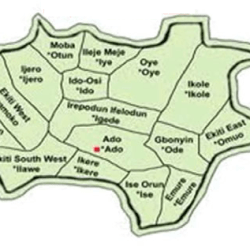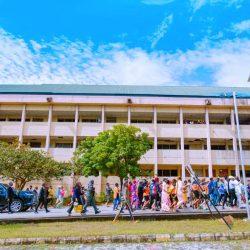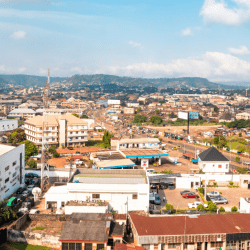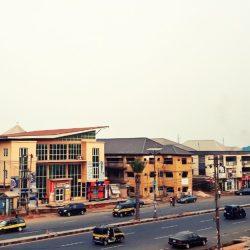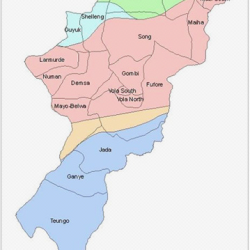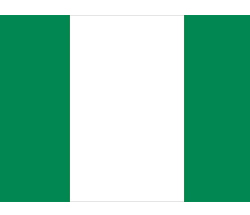Ekiti State has 16 LGAs (Local Government Areas), namely:
- Ado-Ekiti
- Efon
- Ekiti East
- Ekiti South /West
- Ekiti West
- Emure
- Ayekire
- Ido/Osi
- Ijero
- Ikere
- Ikole
- Ilejemeje
- Irepodun/Ifelodun
- Ise/Orun
- Moba
- Oye
> View the 22 LCDAs in Ekiti State and their headquarters
LGAs in Ekiti State: Complete view with Key Facts
Explore the 16 LGAs in Ekiti State with this detailed guide. Learn about their history, importance, and socio-economic roles in Nigeria’s southwest region.
Introduction to Ekiti State
Ekiti State, carved out of the old Ondo State in October 1996, stands as one of Nigeria’s 36 federating units. Located in the southwestern part of the country, Ekiti is rich in culture, history, and natural beauty. Known for its commitment to education and grassroots governance, Ekiti has made remarkable strides in community-led development.
Named after the Ekiti people who are predominantly of Yoruba origin, the state thrives on tradition, unity, and a shared vision for progress. Understanding the Local Government Areas (LGAs) in Ekiti State provides valuable insight into how the state is managed and how services are delivered to its residents.
Administrative Structure in Nigeria
Local Government as a Tier of Governance
Nigeria operates a three-tier system of government: Federal, State, and Local Government. The Local Government Area (LGA) is the third tier and serves as the closest form of administration to the grassroots.
Functions of LGAs
LGAs in Nigeria are responsible for several essential functions:
- Maintenance of local roads and infrastructure
- Primary education management
- Health services at the community level
- Sanitation and waste management
- Revenue collection (markets, motor parks, etc.)
- Local security and community development
Overview of Local Government System in Ekiti
Ekiti State has 16 LGAs, each acting as a mini-government with elected officials and administrative bodies. These LGAs are vital for local decision-making, project implementation, and the provision of social services. They span both rural and urban regions, addressing the diverse needs of the population.
Full List of the 16 LGAs in Ekiti State
Below is a detailed table showing the names of all LGAs in Ekiti State and their administrative headquarters:
| LGA Name | Headquarters |
|---|---|
| Ado-Ekiti | Ado-Ekiti |
| Ikere | Ikere-Ekiti |
| Oye | Oye-Ekiti |
| Ijero | Ijero-Ekiti |
| Irepodun/Ifelodun | Igede-Ekiti |
| Ekiti East | Omuo-Ekiti |
| Ekiti West | Aramoko-Ekiti |
| Ido/Osi | Ido-Ekiti |
| Moba | Otun-Ekiti |
| Ikole | Ikole-Ekiti |
| Gbonyin (Aiyekire) | Ode-Ekiti |
| Emure | Emure-Ekiti |
| Ise/Orun | Ise-Ekiti |
| Efon | Efon-Alaaye |
| Ekiti Southwest | Ilawe-Ekiti |
| Ilejemeje | Iye-Ekiti |
Ado-Ekiti LGA
Ado-Ekiti is the capital city and administrative hub of Ekiti State. It is not only the most populous LGA in the state but also the economic and political center.
- Major Towns: Ado-Ekiti, Agric Olope, Odo Ado
- Economic Activities: Trading, banking, education, hospitality
- Institutions: Ekiti State University, Federal Teaching Hospital
Ikere LGA
Ikere is the second-largest LGA and known for its vibrant cultural festivals and bustling marketplaces.
- Key Features: Proximity to the state capital, robust artisanal sector
- Cultural Attractions: Ikere Day, masquerade festivals
Oye LGA
This LGA is home to the Federal University Oye-Ekiti (FUOYE), giving it an academic flavor and a youthful population.
- Main Towns: Oye, Ilupeju, Ayegbaju
- Industries: Education, small-scale manufacturing
Ido/Osi LGA
One of the most politically active LGAs in Ekiti, Ido/Osi combines traditional leadership with modern governance.
- Towns: Ido-Ekiti, Usi, Ifaki
- Notable Traits: Strong cultural identity, robust cooperative societies
Ekiti West LGA
With its headquarters in Aramoko, this LGA is known for its infrastructural development and educational institutions.
- Special Features: Technical colleges, community health centers
Ekiti East LGA
Located in the eastern axis of the state, Ekiti East is agriculturally inclined and culturally rich.
- Farming Products: Cassava, yam, plantain
- Key Settlement: Omuo-Ekiti
Gbonyin (Aiyekire) LGA
Gbonyin LGA is synonymous with palm oil and local crafts. Its rural character does not hinder its economic relevance.
- Major Economic Activities: Agriculture, pottery, and palm produce
Emure LGA
A traditionally revered town, Emure-Ekiti is famous for its ancient monarchy and cultural pride.
- Historical Sites: Emure palace, age-old shrines
Ise/Orun LGA
Formed by two major communities, Ise and Orun, this LGA is known for indigenous blacksmithing and carving.
- Cultural Richness: Traditional tools and art
Ijero LGA
One of the oldest LGAs in Ekiti, Ijero is noted for its mineral deposits and fertile farmlands.
- Minerals: Quartz, granite
- Farming Activities: Cocoa, maize
Moba LGA
Moba is deeply religious and traditional. Its people are known for upholding ancestral customs.
- Religious Practices: Christianity, Islam, traditional beliefs
- Social Life: Community festivals, church conventions
Ikole LGA
Strategically located, Ikole serves as a gateway to Kogi State. It’s known for its vibrant political scene.
- Topography: Rolling hills, rivers
- Economy: Trade and timber
Irepodun/Ifelodun LGA
This LGA includes Igede-Ekiti and surrounding towns. It is focused on public service delivery and youth programs.
- Institutions: Civic centers, ICT hubs
Efon LGA
With its headquarters at Efon-Alaaye, this mountainous region is blessed with tourism potential and natural beauty.
- Scenery: Rocky outcrops, cold weather
- Cultural Value: Ancient Ekiti war heritage
Ekiti Southwest LGA
Known for large-scale yam farming and palm kernel production, this LGA plays a key role in food supply chains.
- Programs: Youth in Agriculture, Women Empowerment Schemes

Demographic and Socio-Economic Data
According to recent statistics:
- Total Population: Over 2.7 million
- Literacy Rate: Among the highest in Nigeria
- Occupation: Farming, teaching, trading, civil service
Challenges Facing LGAs in Ekiti State
While LGAs are crucial for development, they face hurdles such as:
- Inadequate funding and mismanagement
- Poor road infrastructure
- Lack of modern health facilities
- Brain drain due to youth migration
- Limited job opportunities
Developmental Projects Across LGAs
Despite challenges, several developmental projects are ongoing:
- Road Rehabilitation: Ado-Iyin, Aramoko-Ijero highways
- Healthcare: Primary Health Centers (PHCs) upgrades
- Education: School renovations and teacher trainings
- Partnerships: World Bank and UNDP initiatives
The Future of Local Governance in Ekiti
With increasing digitalization and civic awareness, the future of LGAs in Ekiti State looks promising. There’s potential for:
- E-governance adoption
- Youth engagement through digital tools
- Smart agriculture for economic transformation
- Enhanced transparency and accountability
FAQs on LGAs in Ekiti State
Q1: What are the names of the LGAs in Ekiti State?
A1: Ekiti has 16 LGAs, including Ado, Ikere, Ijero, Ido/Osi, Oye, and others.
Q2: Which is the largest LGA in Ekiti State?
A2: Ado-Ekiti is the largest in terms of population and infrastructure.
Q3: What functions do LGAs serve?
A3: They manage local infrastructure, health services, education, and revenue generation.
Q4: How can I find the headquarters of each LGA?
A4: The table above provides each LGA with its respective headquarters.
Q5: Are LGAs in Ekiti rural or urban?
A5: They are a mix of both, with Ado, Ikere, and Oye being more urbanized.
Q6: Which LGA has the most educational institutions?
A6: Ado-Ekiti and Oye LGA top the list due to universities and secondary schools.
